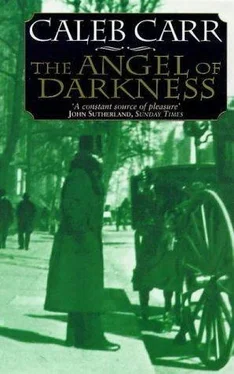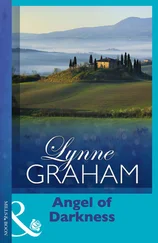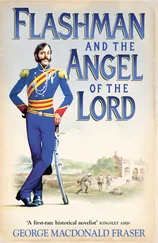Caleb Carr - The Angel Of Darkness
Здесь есть возможность читать онлайн «Caleb Carr - The Angel Of Darkness» весь текст электронной книги совершенно бесплатно (целиком полную версию без сокращений). В некоторых случаях можно слушать аудио, скачать через торрент в формате fb2 и присутствует краткое содержание. Жанр: Детектив, на английском языке. Описание произведения, (предисловие) а так же отзывы посетителей доступны на портале библиотеки ЛибКат.
- Название:The Angel Of Darkness
- Автор:
- Жанр:
- Год:неизвестен
- ISBN:нет данных
- Рейтинг книги:5 / 5. Голосов: 1
-
Избранное:Добавить в избранное
- Отзывы:
-
Ваша оценка:
- 100
- 1
- 2
- 3
- 4
- 5
The Angel Of Darkness: краткое содержание, описание и аннотация
Предлагаем к чтению аннотацию, описание, краткое содержание или предисловие (зависит от того, что написал сам автор книги «The Angel Of Darkness»). Если вы не нашли необходимую информацию о книге — напишите в комментариях, мы постараемся отыскать её.
The Angel Of Darkness — читать онлайн бесплатно полную книгу (весь текст) целиком
Ниже представлен текст книги, разбитый по страницам. Система сохранения места последней прочитанной страницы, позволяет с удобством читать онлайн бесплатно книгу «The Angel Of Darkness», без необходимости каждый раз заново искать на чём Вы остановились. Поставьте закладку, и сможете в любой момент перейти на страницу, на которой закончили чтение.
Интервал:
Закладка:
The main part of his testimony, though, had focused on Libby Hatch herself, and on the notion of whether she was capable of the crime what the state’d charged her with. Dr. White said that, after spending some three hours with the woman, he’d formed the same opinion as Dr. Kreizler: that Libby, though emotional and impulsive, was free from any mental disease and was, especially as far as the legal definition of the word went, sane. But the conclusion Dr. White drew from this was the opposite of what Dr. Kreizler’s had been: Libby’s sanity was a very strong indication-if not outright proof-that she couldn’t have shot her kids. In his experience, he said, there were only three reasons women committed such crimes: insanity, poverty, or the children being illegitimate. Since none of these reasons was in extreme evidence in this case, the state’s explanation of what’d happened was “not credible.”
“The very character of the crime,” Dr. White had said, using words Mr. Picton’d found so outrageous he’d written them down, “is sufficient to warrant a diagnosis of mental disease.” Libby Hatch had no mental disease; so, using logic what, again, was flawed to professional ears but very appealing to a jury, she couldn’t have done it.
But what about all the other cases what Mr. Picton and Dr. Kreizler had brought up, Mr. Darrow’d then asked, cases involving women who’d unquestionably murdered their own children and been found sane by courts and juries? What about Lydia Sherman, for instance? Lydia Sherman, Dr. White’d replied, had unfortunately committed her crimes during a time when mental science was in a much more primitive state; on top of that, people had been so disgusted by the killings that “Queen Poisoner” had been accused of, and there’d been so much evidence and so many witnesses to speak against her, that the possibility of her getting a fair trial, much less being found mentally incompetent, had been about zero. The alienists of the time had been too unsophisticated to understand what’d been wrong with the woman, and the public had been desperate for revenge: this was Dr. White’s simple explanation for why Lydia Sherman’s fate had been sealed. Mr. Darrow’d then asked Dr. White if, in his opinion, this injustice was now being repeated, maybe even outdone, by the state of New York’s attempt to convict and execute Libby Hatch? Yes, Dr. White had solemnly answered; in fact, since Libby Hatch was, in his opinion, innocent, the injustice was even greater.
Finally, there’d been Mrs. Cady Stanton to seal the deal for the defense. Mr. Darrow’s questioning of her had been particularly clever: as a lifelong battler for women’s rights, he’d asked, didn’t Mrs. Cady Stanton feel that members of her sex had to accept all of the burdens as well as the advantages of equality? Didn’t she think that they shouldn’t be allowed to “hide behind their skirts,” to use their gender as an excuse or even an explanation for certain crimes? Of course, Mrs. Cady Stanton had said; and if the crime Libby Hatch had been accused of had been anything other than murdering her own children, the old suffragist wouldn’t have bothered traveling to Ballston Spa to give testimony. But in this one thing, childbirth and parenting, she said, men and women were not and never could be equal. Repeating what she’d told us when she came to Number 808 Broadway, Mrs. Cady Stan ton had lectured the jury and the galleries about the “divine creative power” of women that was made manifest in the connection between a mother and child. If that power was used for evil purposes, she said, it could not be the woman’s doing-after all, no woman could possibly betray a force what, being divine, was greater than her own will. No, if a woman did commit violence against her own child, it was either because she was insane or because the society of men had forced her into it somehow; probably both.
This last point was tough for Mr. Picton to argue on cross-examination; for he, during his time with Dr. Kreizler, had come to understand how very much Libby Hatch’s actions might indeed have been affected by the society of men. But both Mr. Picton and the Doctor held that, such effects aside, Libby was still legally responsible for her own actions, and Mr. Picton had asked Mrs. Cady Stanton if she didn’t agree. No, she’d answered, throwing the Doctor a look what said that, though she wasn’t allowed to speak of it, she did believe that he was involved in some kind of mysterious witch-hunt. No, she said, a woman so harried and hounded as to be capable of murdering her own children must certainly have been driven insane-certainly legally insane, meaning unaware of the nature of her acts or that they were wrong-by man’s society. And since neither the prosecution’s nor the defense’s expert mental witnesses had found Libby to in fact be insane, she could not have committed the crimes.
It had taken only a day to get all this testimony in, and measured as a whole it represented, Mr. Picton said, further proof (not that we needed any) that Mr. Darrow was truly the master of arguing in the negative. Without ever putting his client on the stand (always a dangerous thing for the defense to do in a murder trial), he’d managed to tear apart the state’s assertions with logic what was so turned around-ass-backwards, even-that it seemed to make some kind of sense. Confused at first, the jury’d slowly become convinced; and all Mr. Picton’s desperate efforts to point out that it was plain verbal trickery to say that someone had to be innocent just because they were sane while the crime they were accused of was insane just made him look, as he’d said the night before, like the voice of an older age. Mr. Darrow’s reverse and negative logic had the feel of a new century, of modern thinking, and so, indeed, it was; but as Mr. Picton had also said the night before, being new didn’t make it any more honorable or respectable-just more effective with juries. Which in the end, I suppose, is the only thing what most lawyers have ever considered progress.
Mr. Darrow hadn’t yet closed his case, and he could theoretically call Libby Hatch to the stand on Monday if he wanted to; but there really wasn’t any reason for it. Her little performance when Clara’d been on the stand had been more effective than any testimony she might give about how much she cared for her children; and allowing Mr. Picton a shot at her during cross-examination (the state wasn’t itself allowed to call the defendant) could only lead to trouble. No, from Mr. Darrow’s point of view it was better to keep her where she was: the teary-eyed widow and loving mother at the defense table, whose life had been scarred by terrible losses and tragedies, and who, for all her heroic attempts to overcome a sea of troubles, was now being persecuted by a state government embarrassed by its failure to solve an old and savage crime and an alienist bent on restoring his reputation.
It wasn’t hard, then, to see why the news we brought back from Troy offered so little in the way of consolation to our friends: the question of what in her past had made Libby Hatch the woman she was today, or on the night she’d shot her three children, appeared to be a ship what’d already sailed. As Marcus had said the night before, the jury was past caring about any psychological explanations of what context had produced a normal, sane girl who would one day be capable of murdering her own children; in fact, they were past believing that she had murdered her children in the first place, and if we tried to introduce such testimony we’d just be grasping at air. The only useful thing, it seemed, that might come out of the search was if Libby had committed some other violent act during the years before she’d gone to the Muhlenbergs’ and we could find some way to tie that act to the present proceedings.
Читать дальшеИнтервал:
Закладка:
Похожие книги на «The Angel Of Darkness»
Представляем Вашему вниманию похожие книги на «The Angel Of Darkness» списком для выбора. Мы отобрали схожую по названию и смыслу литературу в надежде предоставить читателям больше вариантов отыскать новые, интересные, ещё непрочитанные произведения.
Обсуждение, отзывы о книге «The Angel Of Darkness» и просто собственные мнения читателей. Оставьте ваши комментарии, напишите, что Вы думаете о произведении, его смысле или главных героях. Укажите что конкретно понравилось, а что нет, и почему Вы так считаете.











